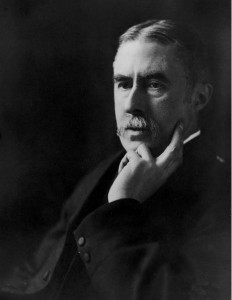From A Shropshire Lad:
- When I was one-and-twenty I heard a wise man say,
- “Give crowns and pounds and guineas but not your heart away;
- Give pearls away and rubies but keep your fancy free.”
- But I was one-and-twenty, no use to talk to me.
- When I was one-and-twenty I heard him say again,
- “The heart out of the bosom was never given in vain;
- ‘Tis paid with sighs a plenty and sold for endless rue.”
- And I am two-and-twenty and oh, ’tis true, ’tis true.
-
That’s why. Alfred doesn’t look the grooviest malchick who ever spacked out on cider in Wiltshire, but appearances can be deceptive.
-
I had never read the whole poem until a couple of months ago, long after I started the book. I’d heard the line ‘blue remembered hills’ the way lots of people sort-of almost have.
Dennis Potter wrote a play called that, about middle-aged men dressing up as schoolboys and playing in the woods, a affluent retirement dystopia that leans a little too heavily on Lord of the Flies transposed to Surrey with an element of Brian Rix farce thrown in to make it massively succesful, I would have thought.
-
What I like about A Shropshire Lad is something that some kind reviewers have said about Not Your Heart Away; underneath the sunny, bucolic forever trance of the memory of those hills there’s an unstated menace, something you can read as almost a dread of finding whatever it is you went there looking for.
- A long time ago I went to see a magician, a shaman, a white witch, call it what you will. He told me one of the things I keep close to me: Be careful what you wish for, in case you get it.
- Not original maybe; a homily that is at least as old as Icarus, who wanted to fly and like Ben, flew much too close to the sun.
-
But that, for me, is the thing hidden at the heart of the blue remembered hills, the heart of the poem. The heart of Not Your Heart Away too.
,/P>



